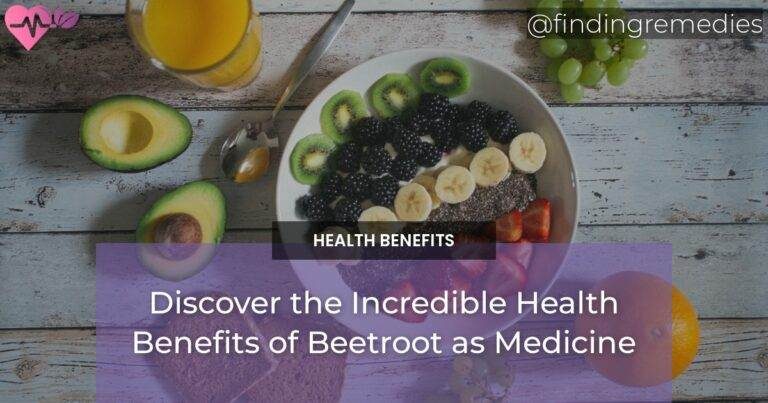Health Benefits of Beetroot
Beetroot, also known as red beet, is a root vegetable that has gained popularity as a superfood in recent years. It is packed with essential nutrients and natural compounds that promote good health. In this article, we will explore the many health benefits of beetroot and how it can be incorporated into a healthy diet.
Nutrition Profile
Beetroot is a rich source of essential nutrients that support a healthy diet. A 100-gram serving of beetroot contains:
- 43 calories
- 1.6 grams of protein
- 0.2 grams of fat
- 9.6 grams of carbohydrates
- 2.8 grams of fiber
- 6% of the recommended daily intake of vitamin C
- 7% of the recommended daily intake of potassium
- 10% of the recommended daily intake of folate
- 16% of the recommended daily intake of manganese
Beetroot is also a rich source of antioxidants, including betalains and anthocyanins, which help protect the body against damage from free radicals.
Natural Compounds
Beetroot contains a number of natural compounds that have been linked to various health benefits. These include:
- Betalains: These are the pigments that give beetroot its distinctive color. Betalains have been linked to anti-inflammatory and antioxidant effects, as well as potential benefits for brain health.
- Nitrates: Beetroot is high in nitrates, which are converted to nitric oxide in the body. Nitric oxide helps to relax blood vessels and improve blood flow, which can have a positive effect on blood pressure and athletic performance.
- Fiber: Beetroot is a good source of fiber, which is important for digestive health and can also help reduce the risk of chronic diseases like heart disease and type 2 diabetes.
ALSO READ
Healing Diseases
There is some evidence to suggest that beetroot may have healing properties for certain diseases. For example:
- Heart disease: The nitrates in beetroot may help improve blood flow and reduce blood pressure, which can lower the risk of heart disease.
- Cancer: The antioxidants in beetroot may have anti-cancer effects, although more research is needed in this area.
- Inflammation: The betalains in beetroot may have anti-inflammatory effects, which could potentially help reduce the risk of chronic diseases like arthritis and Alzheimer’s disease.
Improving Health
Beetroot has been linked to a number of health benefits, including:
- Lowering blood pressure
- Improving athletic performance
- Reducing inflammation
- Boosting brain health
- Improving liver health
- Aiding digestion
These benefits are linked to the natural compounds present in beetroot, including nitrates, betalains, and fiber.
ALSO READ
Types and Varieties
There are many different types and varieties of beetroot available, including:
- Red beetroot: This is the most common type of beetroot, with a deep red color and sweet flavor.
- Golden beetroot: This variety has a bright yellow color and a milder flavor than red beetroot.
- Chioggia beetroot: This variety has a distinctive pink and white striped appearance and a sweet, mild flavor.
While the nutritional content of these varieties is similar, the taste and texture can vary.
Effects of Cooking
Cooking can affect the nutritional content of beetroot, particularly if it is boiled or overcooked. To preserve the nutrients in beetroot, it is best to:
- Eat it raw in salads or smoothies
- Roast or grill it to retain nutrients
- Steam it to minimize nutrient loss
Proper Storage
Beetroot should be stored in a cool, dry place, away from direct sunlight. It can be stored in the refrigerator for up to two weeks. To prevent spoilage, beetroot should be kept in a perforated plastic bag to allow for air circulation.
Risk Factors
While beetroot is generally considered safe for most people, there are some potential risks associated with consuming beetroot. These include:
- Increased risk of kidney stones in people with a history of kidney problems
- Allergic reactions in people with a sensitivity to beets
- Interference with certain medications, such as blood thinners
People who are at a higher risk for these adverse effects should talk to their doctor before consuming beetroot.
Advantages and Disadvantages
Overall, there are many advantages to incorporating beetroot into a healthy diet. However, there are also some potential downsides, including:
- The risk of adverse effects in some individuals
- The potential for staining teeth and clothing due to the deep red color of beetroot
- The need to consume beetroot in moderation due to its high sugar content
Conclusion
Beetroot is a nutrient-dense vegetable that has many health benefits. It is rich in essential nutrients and natural compounds that can promote good health and help prevent chronic diseases. By incorporating beetroot into a healthy diet, individuals can reap the many benefits of this superfood.

